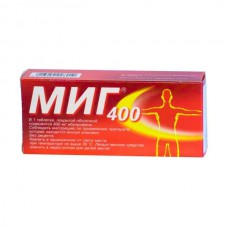Expiration date: 02/2026
The composition and form of issue:
Tablets, film-coated 1 tablet contains active substance:
ibuprofen 400 mg
excipients: starch corn carboxymethyl starch sodium salt type a silicon dioxide highly dispersed magnesium stearate
shell: hypromellose titanium dioxide (E171) povidone K30 macrogol 4000
in blisters of PVC/aluminium foil for 10 units in the stack cartons 1 or 2 blisters.
Description of dosage form:
Oval-shaped tablets, coated in white or near white, with double-sided Risco for division and embossed "E" on either side on both sides of the risk.
Pharmacokinetics:
Suction
Well absorbed from the stomach. Cmax of ibuprofen in plasma is approximately 30 µg/ml and Tmax about 2 h after administration at a dose of 400 mg.
Distribution
Ibuprofen is approximately 99% bound to plasma proteins. It is slowly distributed in the synovial fluid and excreted from it more slowly than from the blood plasma.
Biotransformation
Ibuprofen is metabolized in the liver mainly by hydroxylation and carboxylation of isobutyl group. Metabolites are pharmacologically inactive.
Breeding
Has 2-phase kinetics of elimination. T1/2 from plasma is 2-3 h Until 90% of the dose can be detected in the urine as metabolites and their conjugates. Less than 1% is excreted unchanged in urine and to a lesser extent — with bile.
Description of the pharmacological action:
Ibuprofen is a propionic acid derivative and has analgesic, antipyretic and anti-inflammatory action due to non-selective blockade of COX-1 and -2, as well as inhibitory effect on the synthesis of PG.
The analgesic effect is most pronounced when the pain of an inflammatory nature. Analgesic activity of the drug does not belong to the narcotic type.
Like all NSAIDs, ibuprofen exhibits antiplatelet activity.
Indications:
- headache
- migraine
- toothache
- neuralgia
- pain in muscles and joints
- menstrual pain
- feverish condition in colds and flu.
Contraindications:
- hypersensitivity to any of the ingredients that make up the drug
- hypersensitivity to acetylsalicylic acid or other NSAIDs history
- erosive and ulcerative diseases of gastrointestinal tract (including peptic ulcer of stomach and duodenum in the acute stage, Crohn's disease, ulcerative colitis)
- aspirin asthma
- hemophilia and other bleeding problems (including anticoagulation), hemorrhagic diathesis
- bleeding of any etiology
- the deficit glukozo-6-fosfatdegidrogenaza
- pregnancy
- lactation
- children under 12 years old
- diseases of the optic nerve.
With caution: advanced age, heart failure, arterial hypertension, liver cirrhosis with portal hypertension, hepatic and/or renal failure, nephrotic syndrome, hyperbilirubinemia, peptic ulcer and duodenal ulcer (in history), gastritis, enteritis, colitis, blood disorders unclear etiology (leukopenia and anemia).
Application during pregnancy and breast-feeding:
With regard to the safety of the use of ibuprofen during pregnancy, there is not enough experience to date. Therefore, in the first 6 months of pregnancy the drug should not be used. Ibuprofen is contraindicated in the last trimester of pregnancy.
Side effect:
From the digestive tract: NSAIDs-gastropathy (abdominal pain, nausea, vomiting, heartburn, decreased appetite, diarrhea, flatulence, constipation rarely — ulceration of the gastrointestinal mucosa, which in some cases are complicated by perforation and bleeding), irritation or dryness of the oral mucosa, mouth pain, ulceration of the gum mucosa, aphthous stomatitis, pancreatitis.
From the hepatobiliary system: hepatitis.
From the respiratory system: shortness of breath, bronchospasm.
Organs of hearing: hearing disorders (hearing loss, ringing or roaring in the ears).
In the Central and peripheral nervous systems: headache, dizziness, insomnia, anxiety, nervousness and irritability, psychomotor agitation, drowsiness, depression, confusion, hallucinations, rarely — aseptic meningitis (more often in patients with autoimmune diseases).
From the CCC: cardiac failure, tachycardia, increased blood pressure.
From the urinary system: acute renal failure, allergic nephritis, nephrotic syndrome (edema), polyuria, cystitis.
Allergic reactions: skin rash (usually erythematous or urticaric), itching, Quincke edema, anaphylactoid reactions, anaphylactic shock, bronchospasm or dyspnea, fever, multiform exudative erythema (including Stevens-Johnson syndrome), toxic epidermal necrolysis (Lyell's syndrome), eosinophilia, allergic rhinitis.
On the part of the blood: anemia (including hemolytic, aplastic), thrombocytopenia, and thrombocytopenic purpura, agranulocytosis, leukopenia.
From the visual organs: toxic lesion of the optic nerve, unclear vision or double vision, scotoma, dryness and irritation of the eyes, swelling of the conjunctiva and eyelids (including allergic Genesis).
With prolonged use of the drug in high doses increases the risk of ulceration of the gastrointestinal mucosa, bleeding (gastro-intestinal, gingival, uterine, hemorrhoidal), visual impairment (violation of color vision, scotoma, lesions of the optic nerve).
The laboratory parameters: increase of bleeding time, decrease of glucose concentration in blood serum, decrease in hematocrit and/or hemoglobin, increased serum creatinine concentration, increase in liver transaminases.
Drug interaction:
The effectiveness of furosemide and thiazide diuretics may be reduced due to sodium retention associated with inhibition of the synthesis of PG in the kidneys.
Ibuprofen can enhance the effect of oral anticoagulants, so the simultaneous use of ibuprofen and oral anticoagulants is not recommended.
At simultaneous appointment with acetylsalicylic acid, ibuprofen reduces its antiplatelet effect (it is possible to increase the frequency of acute coronary insufficiency in patients receiving small doses of acetylsalicylic acid as an antiplatelet agent).
Ibuprofen can reduce the effectiveness of antihypertensive agents.
In the literature described isolated cases of increased plasma concentrations of digoxin, phenytoin and lithium while taking ibuprofen.
Ibuprofen, like other NSAIDs, should be used with caution in combination with acetylsalicylic acid or other NSAIDs and GCS (this increases the risk of adverse effects of the drug on the gastrointestinal tract).
Ibuprofen may increase the concentration of methotrexate in plasma.
Combined treatment with zidovudine and ibuprofen can increase the risk of hemarthrosis and hematoma in HIV-infected patients suffering from hemophilia.
Combined use of ibuprofen and tacrolimus may increase the risk of nephrotoxic action due to decreased synthesis of PG in the kidneys.
Ibuprofen increases the hypoglycemic effect of oral hypoglycemic agents and insulin may need to adjust their dose.
Method of application and doses:
Inside.
Dosing regimen is set individually, depending on the indications.
Adults and children over 12 years the drug is usually prescribed in an initial dose of 200 mg 3-4 times a day. To achieve a rapid therapeutic effect, the dose can be increased to 400 mg 3 times a day. Once the therapeutic effect is achieved, the daily dose is reduced to 600-800 mg.
Do not use this medicine for more than 7 days or higher doses without consulting your doctor.
In patients with impaired renal function, liver or heart dose should be reduced.
Overdose:
Symptoms: abdominal pain, nausea, vomiting, inhibition, drowsiness, depression, headache, tinnitus, metabolic acidosis, coma, acute renal failure, lowering blood PRESSURE, bradycardia, tachycardia, atrial fibrillation, respiratory arrest.
Treatment: gastric lavage (only for an hour after administration), activated charcoal, alkaline drink, forced diuresis, symptomatic therapy (correction of acid-base state, blood PRESSURE).
Precautionary measures:
In the event of signs of bleeding from the gastrointestinal tract ibuprofen should be canceled (see "Contraindications").
Ibuprofen can mask objective and subjective signs of infection, so ibuprofen therapy in patients with infection should be administered with caution.
The emergence of bronchospasm is possible in patients suffering from bronchial asthma or allergic reactions in history or in the present.
Side effects can be reduced by using the minimum effective dose. With prolonged use of analgesics, the risk of developing analgesic nephropathy is possible.
The use of ibuprofen may adversely affect female fertility and is not recommended for women planning pregnancy.
Patients who noted visual disturbances during treatment with ibuprofen should discontinue treatment and undergo an eye examination.
Ibuprofen may increase the level of liver enzymes.
During treatment, it is necessary to control the picture of peripheral blood and the functional state of the liver and kidneys.
If you see symptoms of gastropathy shows careful monitoring, including conducting esophagogastroduodenoscopy, blood test with determination of hemoglobin, hematocrit, fecal occult blood.
For the prevention of NSAID-gastropathy should be combined with drugs PGE (misoprostol).
If it is necessary to determine 17-ketosteroids, the drug should be canceled 48 hours before the study.
Influence on the ability to drive a car or perform work that requires increased speed of physical and mental reactions. Patients should refrain from all activities that require greater attention, rapid mental and motor responses. During treatment is not recommended intake of ethanol.



